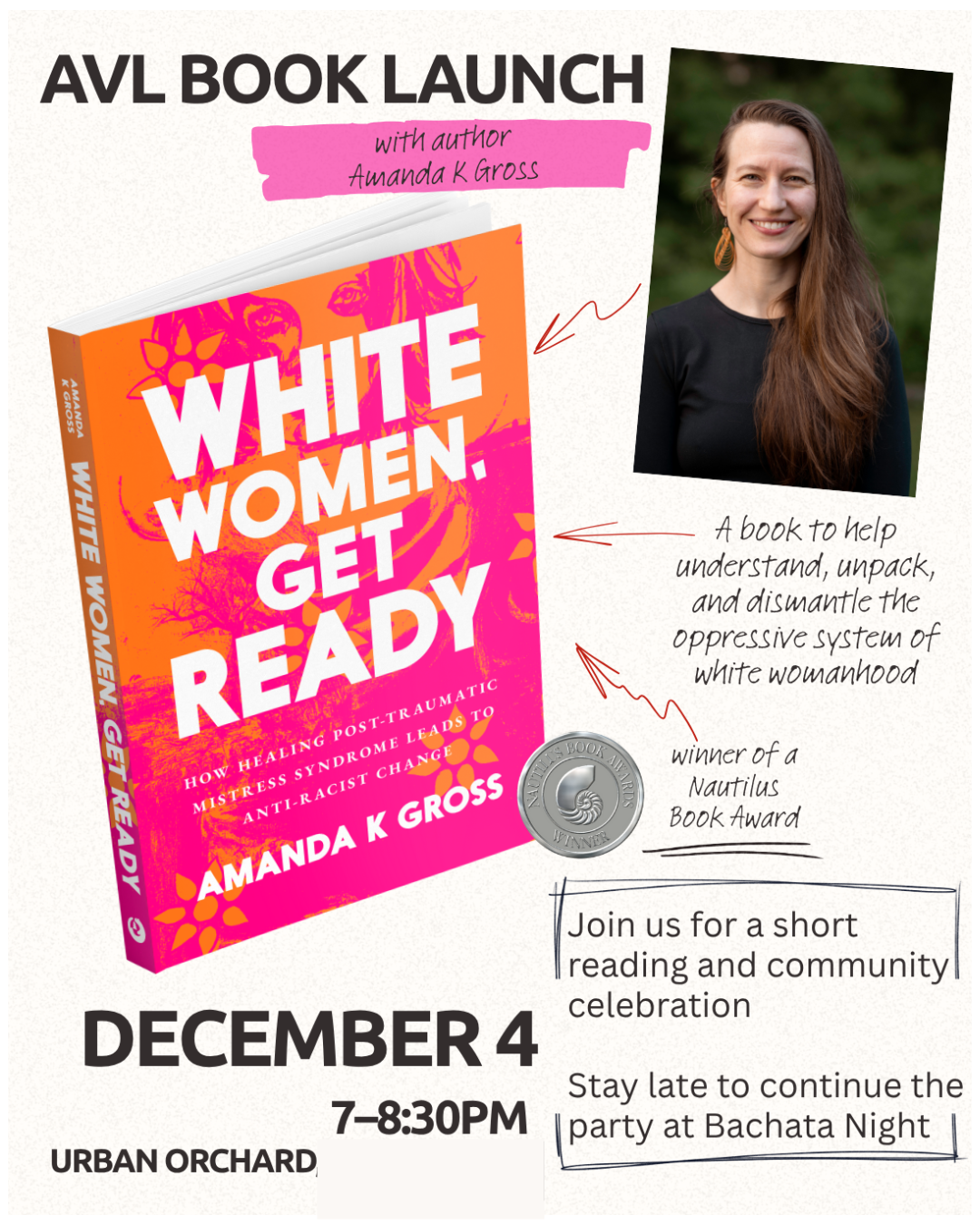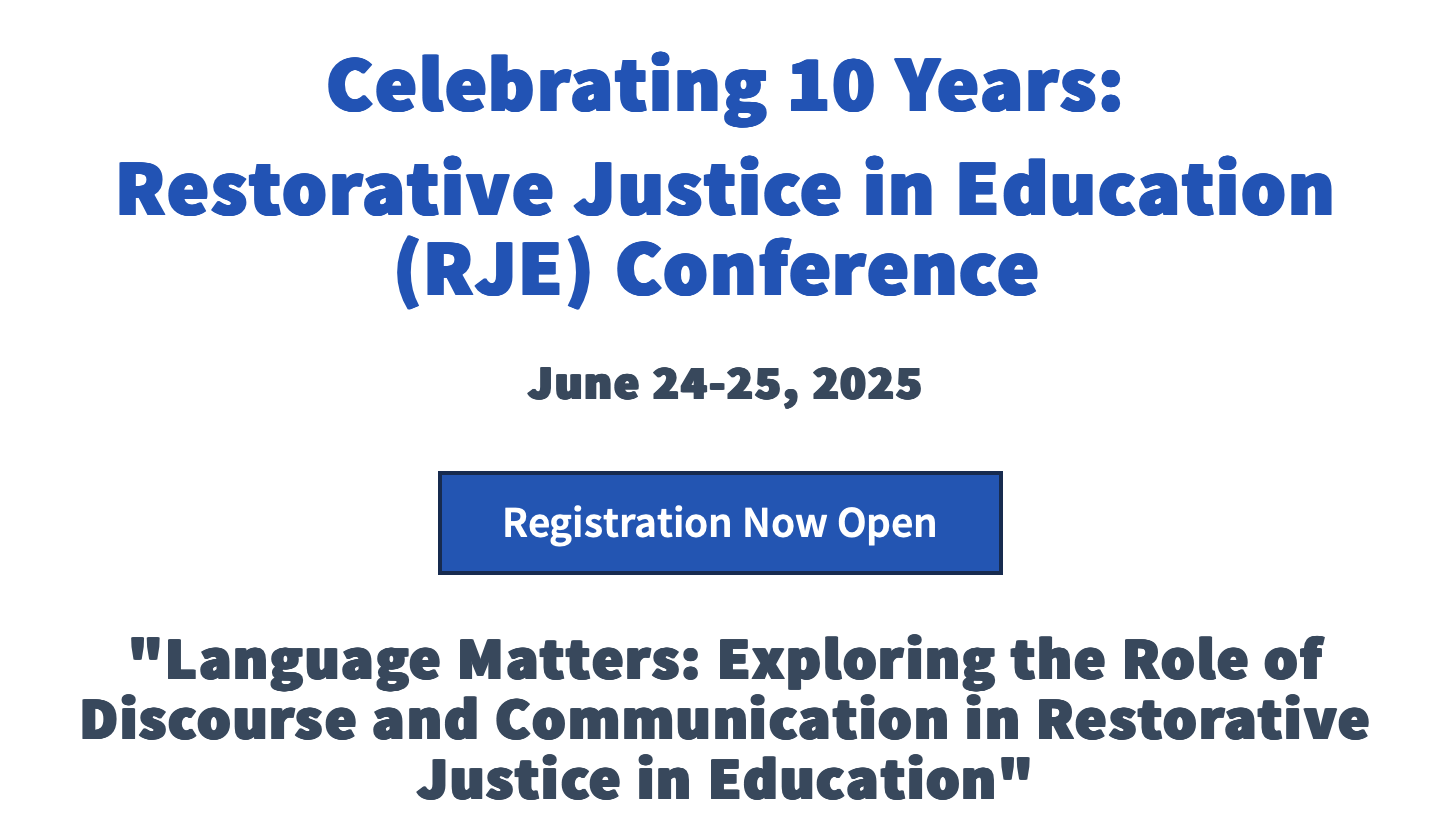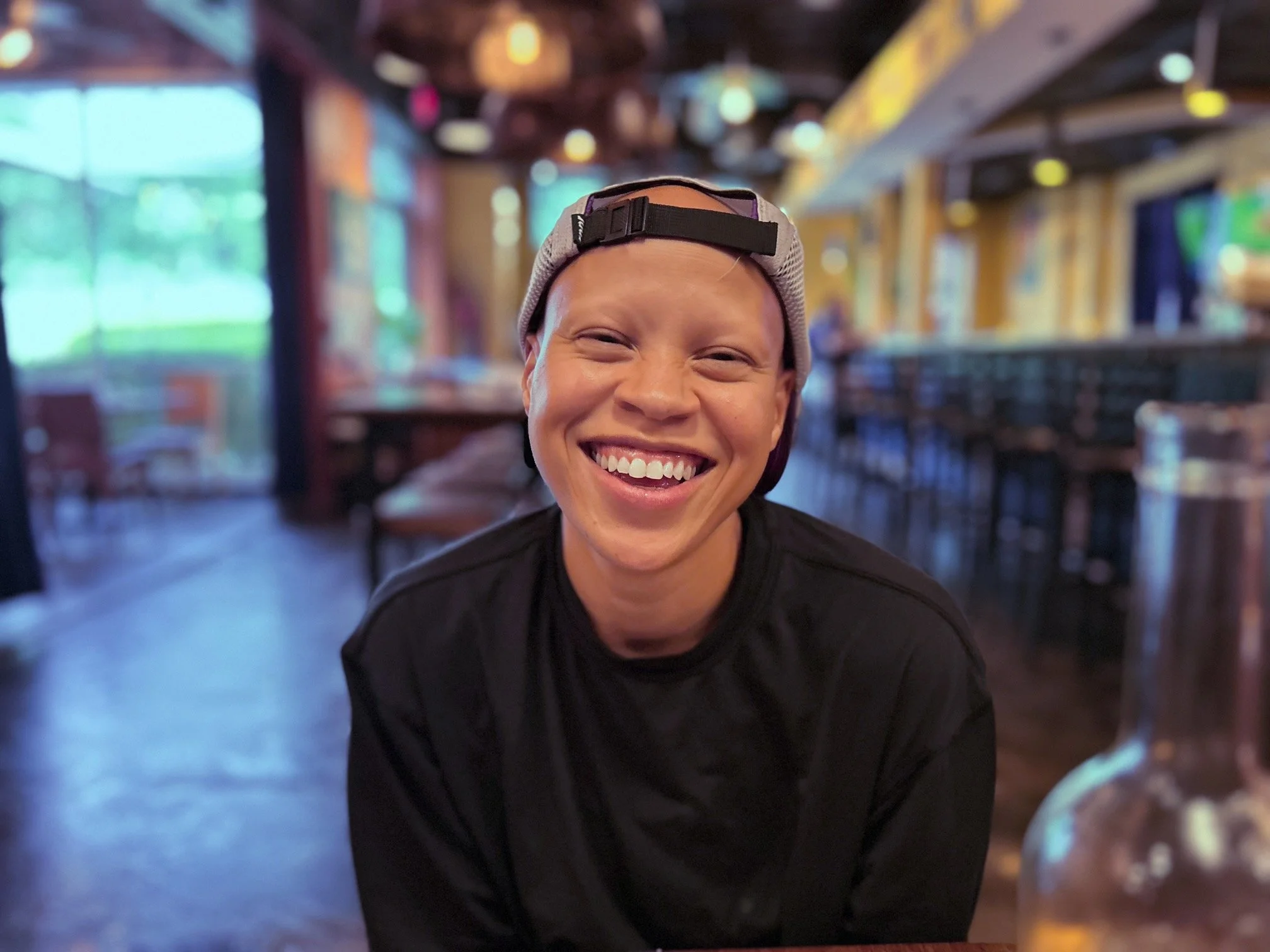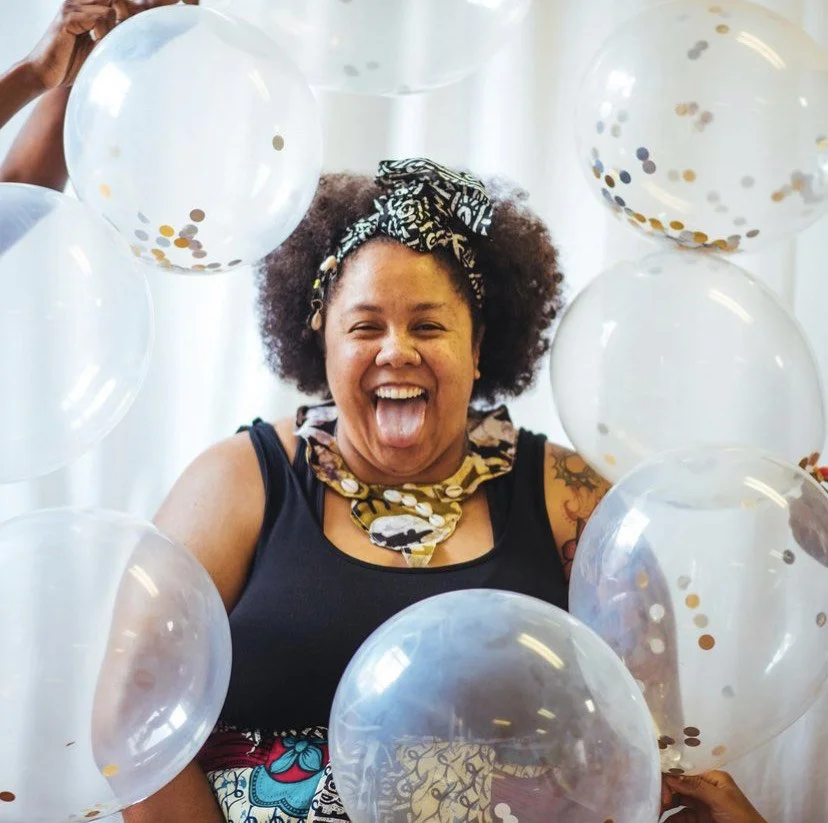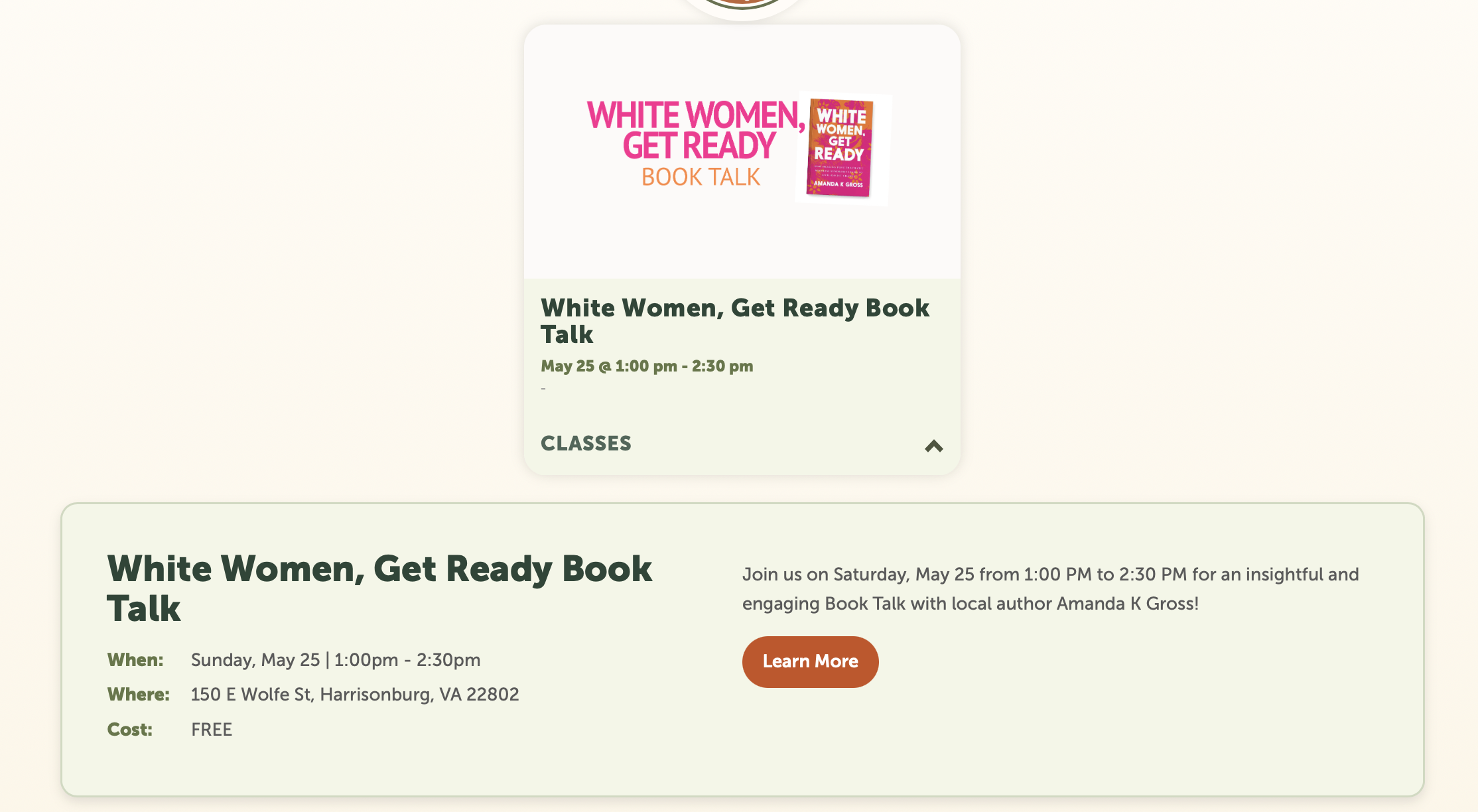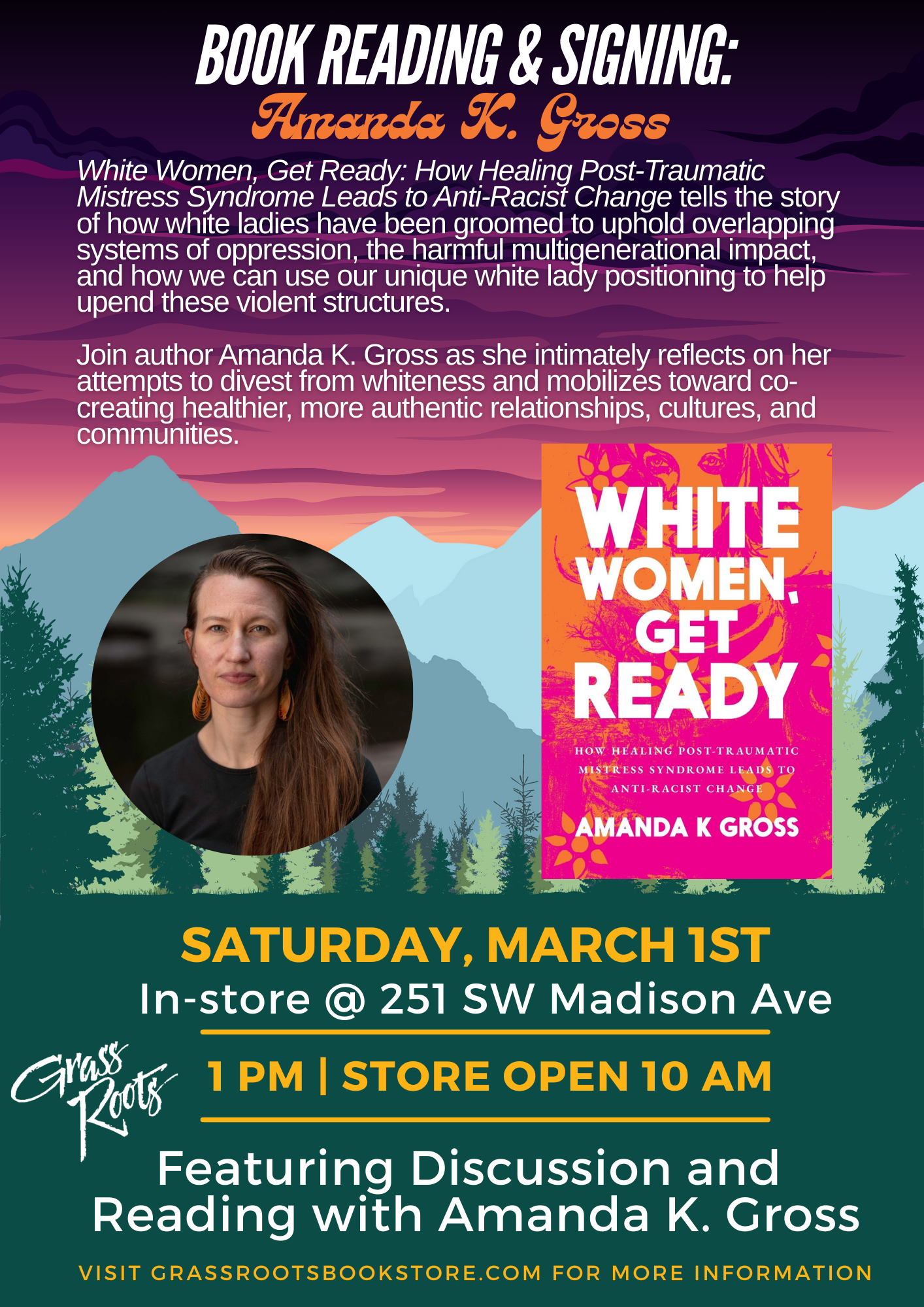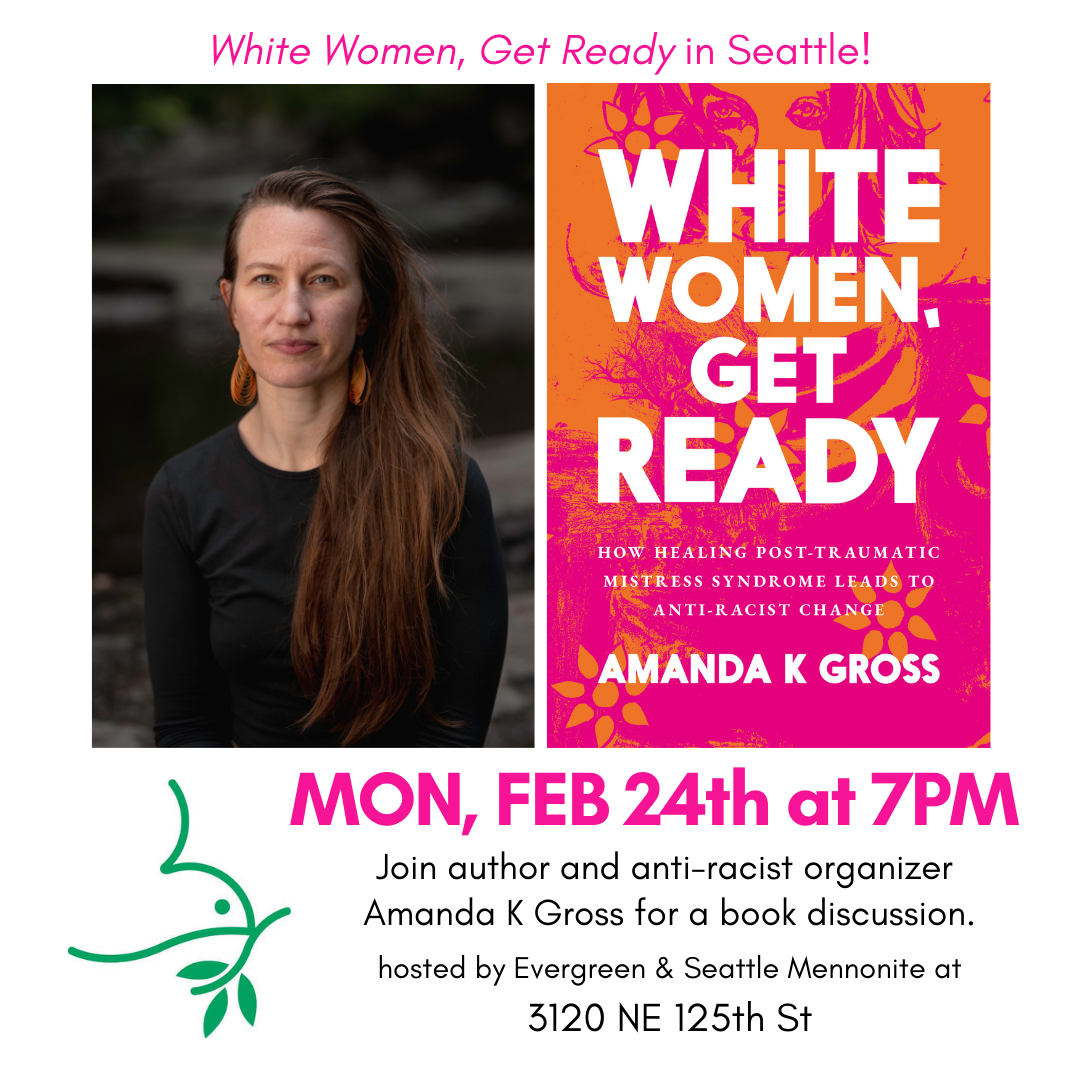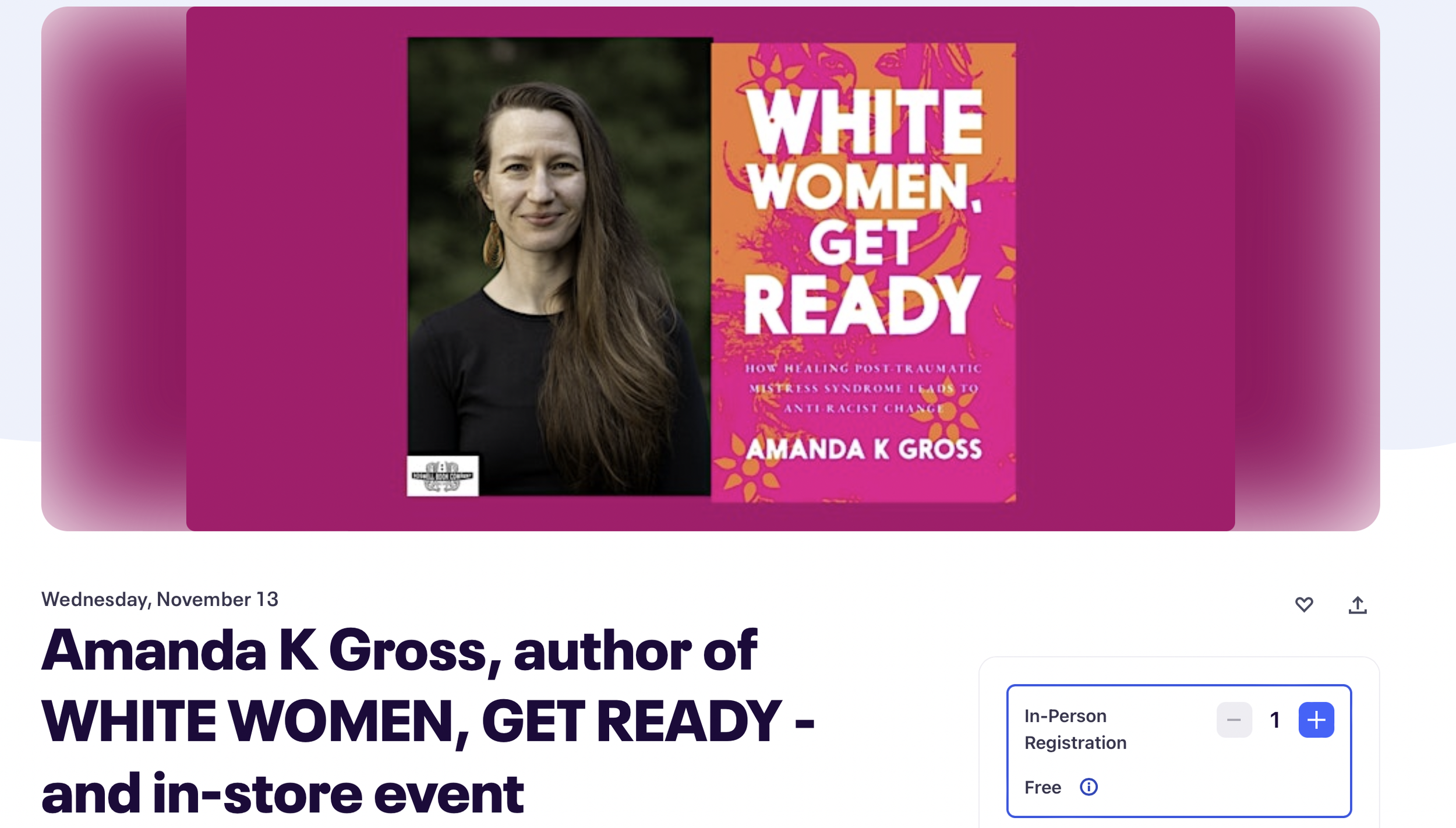Upcoming & Past Events

Virtual WWGR Book Group
Announcing our 2026 White Women, Get Ready — Book Discussion Group via Patreon
Engage with author Amanda K Gross and co-facilitators for a twice monthly virtual session, as we discuss White Women, Get Ready: How Healing Post-Traumatic Mistress Syndrome Leads to Anti-Racist Change. Our group will use discussion questions and supporting activities from the Discussion Guide, accompanying workbook, and arts and somatic practices.
Format
The next book group will begin January 25, 2026. We will meet twice monthly on Sundays from 6–8pm eastern with the exception of 3 meetings in March and one in April. Sessions will be co-facilitated by author, Amanda K Gross and other skilled facilitators who have been engaging with anti-racism and white womanhood. The book is written in four sections and has fifteen chapters, along with a foreword, introduction, unconclusion, and afterword.
Exact meetings dates, 2026:
Jan 25
Feb 1, 15
March 1, 15, 29
April 19
May 3, 17
June 7, 28
July 12, 26
Aug 9, 23
Potential Closing retreat on September 6 or 7 (Labor day weekend)

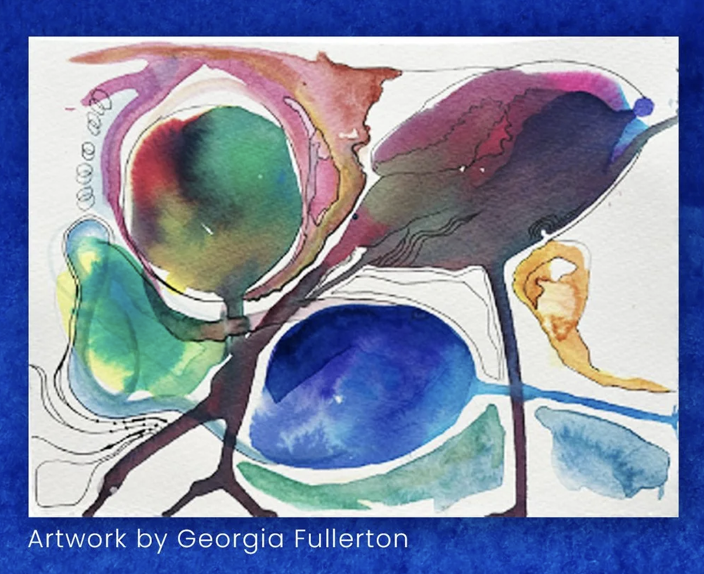
Healing (Trauma) Containers: An Expressive Arts-Based Investigation with White Settler Family Members
46th CATA-ACAT Conference in partnership with OEATA:
Dreaming us Forward: Co-creating Belonging through the Healing Arts
September 25 (pre-conference), 26-27, 2025
The Fort Garry Hotel
222 Broadway, Winnipeg, MB.
R3C 0R3
In-Person Event
Join Amanda K Gross in her workshop: Healing (Trauma) Containers: An Expressive Arts-Based Investigation with White Settler Family Members
In this interactive workshop, participants will create a small sculpture (trauma) container. Amanda shares stories and reflections from her doctoral research in which she worked with white settler family members to consider themes of anti-racism, decolonization, and deconstructing multigenerational family patterns. Amanda’s dissertation, Living (Trauma) Containers for Healing Justice, Transformation, and Collective Liberation: An Autoethnographic Expressive Arts-Based Investigation with White Settler Family Members, integrated autoethnographic, expressive arts, and arts-based methods to engage in dialogue around relevant excerpts from her book, White Women, Get Ready: How Post-Traumatic Mistress Syndrome Leads to Anti-Racist Change.
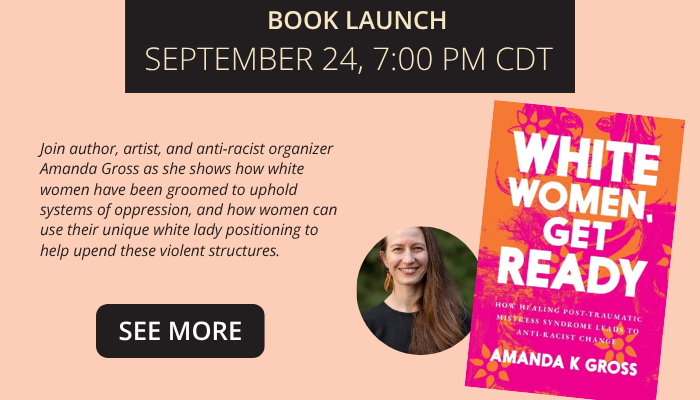
Canada Book Launch -- White Women, Get Ready
Join author, artist, and anti-racist organizer Amanda Gross as she shows how white women have been groomed to uphold systems of oppression, and how women can use their unique white lady positioning to help upend these violent structures.
In person and livestream.
7pm Central/8pm Eastern


Restorative Justice in Education Conference
Join Dr. Ariana Brazier, sheba gittens, and Dr. Amanda K Gross for their June 25th session: Discipline Versus Punishment: Integrating Anti-Racism And Consent-Based Practices For Co-Creating Liberatory Classrooms
For more conference info and to register click here.
Discipline Versus Punishment: Integrating Anti-Racism And Consent-Based Practices For Co-Creating Liberatory Classrooms
This session will consider the discourse of punitive school policies, unpack assumptions, goals, and practices surrounding anti-racism and consent within Restorative Practices, and invite participants to engage in envisioning liberatory futures for Restorative Justice within education.
Related to the conference theme, our session will examine discourses in education around discipline and punishment, how they are often conflated, and the ways Restorative Justice can present as non-punitive despite continuing to perpetuate coercive strategies, particularly in the gaps between restorative practice and embodied anti-racism, cultural colonialism, and power-shifting and consent.
This session draws upon the work of Pittsburgh, PA’s YUIR (Youth Undoing Institutional Racism) which organized to dismantle the school-to-prison pipeline and bring an anti-racist analysis to restorative practice models within Pittsburgh Public Schools. The Discipline versus Punishment framework was developed by Dr. Ariana Brazier.
Dr. Ariana Brazier
Ariana Denise Brazier, Ph.D. is a Black queer feminist and smiley sad mom-girl. She is a play-driven community-organizer and educator who is motivated to raise a joyous, free Black child. Ari received her doctoral degree in English, Critical & Cultural Studies from the University of Pittsburgh in April 2021. Ari has been described by the people she loves as southern, explosive, abstract, intricate, and awkward. As a researcher, Ari’s work is centered on Black children and families living in poverty in the southeast United States. She documents how Black child play functions as a grassroots method of community-based storytelling, teaching, and organizing. Motherhood continues to be a kaleidoscopic experience. All the while, her son, Remix, is the most evolutionary joy she has ever known. Ari is the founder, CEO & President of the 501c3 nonprofit ATL Parent Like A Boss, Inc. (Parent LAB). Parent LAB's mission is to enhance generational literacies through PLAY in underserved African American communities.
sheba gittens
sheba gittens is an anti-racist heArtivist, art educator, and creative consultant based in this iteration of the world. She is a trained Wellness Practitioner, Anti-Racist Raja Yoga Instructor, and Joy Facilitator. As a creative consultant she has supported numerous organizations and businesses nationally and internationally in manifesting events, programs, and workshops grounded in equity for humanity and that honor intersectionality. As an integrative multimedia heArtivist, she uses mixed media to educate and expand the consciousness of those she serves and currently works with the Ujamaa Collective, Balafon West African Dance Ensemble, and YogaRoots On Location.
Dr. Amanda K. Gross
Dr. Amanda K. Gross is an artist, intersectional anti-racist organizer, and a weaver of people, ideas, and threads and creative director of Mistress Syndrome, LLC. Amanda has a PhD in Expressive Arts from the European Graduate School and an MA in Conflict Transformation from Eastern Mennonite University’s Center for Justice and Peacebuilding. She is certified at the 200 hour RYT level by YogaRoots On Location’s Anti-Racist Raja Yoga School. Her first full length book, White Women, Get Ready: How Healing Post-Traumatic Mistress Syndrome Leads to Anti-Racist Changewas published in July 2024. She has a chapter in Resistance: Confronting Violence, Power and Abuse within Peace Churchesand one in the forthcoming book, Bodies and Beliefs: Purity Culture and the Rhetoric of Religious Trauma.

Online Event: Disrupting Patterns of White Womanhood in Our Social Justice Movements
Arc of White Womanhood Lifework Session #12
White Women, Get Ready: Disrupting Patterns of White Womanhood in Our Social Justice Movements
Wednesday, June 4, 2025, 3-5pm Pacific, 7-9pm Eastern
Lifework Sessions are a companion to The Arc of White Womanhood, a course for those socialized white & female, concerning intersections of race and gender. You do not have to have completed The Arc or previous LW sessions.
Join author, artist, and anti-racist organizer Amanda K Gross for an introductory session about her book, White Women, Get Ready: How Healing Post-Traumatic Mistress Syndrome Leads to Anti-Racist Change. We will learn about the Mistress Syndrome healing justice frame, work with an embodied tool for interrupting patterns of white womanhood, and invite questions during a Q&A.
Inspired by Dr. Joy DeGruy's work on Post Traumatic Slave Syndrome, White Women, Get Ready tells the story of how white ladies have been groomed to uphold overlapping systems of oppression, the harmful multigenerational impact, and how we can use our unique white lady positioning to help upend these violent structures.
About the Workshop Presenter:
Amanda K Gross is an intersectional anti-racist organizer, a weaver of people, ideas, and threads, and author of White Women, Get Ready: How Healing Post-Traumatic Mistress Syndrome Leads to Anti-Racist Change.
As a mixed media artist and trained yoga instructor, she integrates creative embodied practices throughout her anti-racist organizing. Amanda is certified at the 200 hour RYT level by YogaRoots On Location’s Anti-Racist Raja Yoga School. She has an MA in Conflict Transformation and a PhD in Expressive Arts.

Friendly City Food Co-op Book Event
This White Women, Get Ready book talk is free and open to the public hosted by the Harrisonburg Friendly City Food Co-op.

Handley Rally for Reading, Winchester
Handley Rally for Reading
Join author, Amanda K Gross at the Handley Rally for Reading in Winchester, Virginia!
Celebrate the launch of the all ages “Color Our World” Summer Reading Program. Enjoy colorful activities around the Reading Garden and learn how summer reading can earn you prizes all summer long. Get crafty at the Adult Booth, artsy at the Kid Booth, and enjoy live music performed by the Davis Bradley Duo.
This is the first of three Rally for Reading events at all branches!

Winchester Book Events
Join us for this progressive book event on Thursday, May 15th in Winchester, Virginia!
4–5:30pm — Book Signing at the Winchester Book Gallery
6pm — Lecture with Q&A at the Handley Library Auditorium
8–10pm — Book Signing and Conversation at the Dividing Creek Beer Co.

WWGR in Columbia, SC
On April 25th the White Women, Get Ready book tour travels to Columbia, South Carolina.
Join us Friday evening for an author event at All Good Books at 7pm.

Race + IP 2025 Conference
Join Felicia Savage Friedman and Amanda K Gross at the University of Pittsburgh’s Race + IP 2025 Conference.
In 2017, we (Felicia Savage Friedman and Amanda K Gross) debuted a workshop titled the Wicked Webs of Racism, Patriarchy, and Capitalism at the Pittsburgh Summit Against Racism. As anti-racist practitioners in deep transracial organizing relationship, this co-created body of work became a foundational piece in our shared and independently-led workspaces. As our work began to expand, we realized that we needed to clarify expectations of use, attribution, and compensation, and do so in ways that aligned with our shared intersectional anti-racist principles, maintained ongoing and evolving relationality, and did not uncritically rely on status quo legalistic models. We offer a conversation between us that considers our experience in seeking legal counsel (eventually leading to a legal IP agreement), the years of organizing that followed, and the tensions between power, intellectual property, and Abolitionist Ethics within the context of anti-racist organizing and healing justice work.
BIOS
Felicia has been transforming lives for over 30 years through her trauma-informed practice and teaching of Raja Yoga as an embodied pathway to collective liberation. As a Black, queer, cisgender woman, Felicia nurtures healthy reciprocal relationships through unconditional love, authenticity, and accountability. As the Founder and CEO of YogaRoots on Location, Felicia has taught liberatory frameworks and modalities to thousands of students through AntiRacist Raja Yoga Teacher Trainings, Youth AntiRacist Raja Yoga Trainings, Continuing Education, and Professional Development programs. She is the Community Co-lead of The Pittsburgh Study (TPS) and was integral to the success of earning both the W.K. Kellogg Foundation Community Engagement Scholarship Award and the C. Peter Magrath Awards. Felicia is the first community member, who doesn’t have a PhD or an MD, a faculty appointment in UPitt’s School of Medicine, the director of the course Antiracism and Health Equity Solutions with second and first year medical students.
Amanda is an intersectional anti-racist organizer, weaver of people, ideas, and threads, and author of White Women, Get Ready: How Healing Post-Traumatic Mistress Syndrome Leads to Anti-Racist Change. As an artist and trained yoga instructor, she integrates creative embodied practices throughout her anti-racist organizing. Amanda is certified at the 200 hour RYT level by YogaRoots On Location’s Anti-Racist Raja Yoga School. She has an MA in Conflict Transformation and a PhD in Expressive Arts where her research investigates how arts and culture can support white settlers in sustaining long-term anti-racist and decolonization efforts.

Rocktown Author Event
Make it stand out
Join Author, Amanda K Gross at the 2025 Rocktown Author Festival from 10am–3pm. She will be tabling and part of the Panel 3 discussion!
Rocktown Author Festival
Massanutten Regional Library (MRL)'s Rocktown Author Festival is an annual event that celebrates local authors and offers support to attendees who wish to become published authors! Our 2025 Rocktown Author Festival will be held Saturday, April 12th from 10 AM to 3 PM at Central Library in downtown Harrisonburg. The Festival includes a free, open forum for the public to meet and greet 36 local authors, purchase their works, and have books signed by the authors! If you want to begin your own writing and publishing journey and need inspiration or advice, then you can register for three free expert-led panels. Keep reading for the panel schedule:
Panel 1: Picture This! The Collaborative Process of Publishing Children's Picture Books
10:30 AM - 11:15 AM
Panel 2: Two Sides of the Story: Insights Into Traditional and Self-Publishing
12:30 PM - 1:15 PM
Panel 3: Stories That Reflect Us All: Writing Diverse Characters and Narratives
1:30 PM - 2:15 PM
Do you want to attend the Festival panels? Click the links above to register today, and keep an eye on our Instagram and Facebookfor announcements on the attending authors!

Our Work to Do: Healing Cycles of Harm in the Service of Anti-Racist Solidarity, Healing, and Repair
This two-hour interactive workshop will consider the strong embodied reactions that sometimes arise within racial justice organizing spaces, how these reactions are connected to unhealed cycles of harm, and how we can acknowledge and learn from them in order to deepen intrapersonal and collective healing, solidarity, and repair.
Please wear comfortable clothes and come prepared to engage with gentle movement and breathwork. All ages and abilities are welcome.
Copies of White Women, Get Ready will be available for sale. Focused book discussion to follow.
About Amanda K Gross
Amanda K Gross is an intersectional anti-racist organizer, a weaver of people, ideas, and threads, and author of White Women, Get Ready: How Healing Post-Traumatic Mistress Syndrome Leads to Anti-Racist Change. As a mixed media artist and trained yoga instructor, she integrates creative embodied practices throughout her anti-racist organizing. Amanda is certified at the 200 hour RYT level by YogaRoots On Location’s Anti-Racist Raja Yoga School. She has an MA in Conflict Transformation and a PhD in Expressive Arts.
About the book
Inspired by Dr. Joy DeGruy's work on Post Traumatic Slave Syndrome—and used with her blessing—White Women, Get Ready: How Healing Post-Traumatic Mistress Syndrome Leads to Anti-Racist Change tells the story of how white ladies have been groomed to uphold overlapping systems of oppression, the harmful multigenerational impact, and how we can use our unique white lady positioning to help upend these violent structures.
This book is one part of a larger body of collaborative work that emerged from the call within Black-led multiracial and multicultural spaces for white people, and white women in particular, to organize our own. Conceived out of multi-racial organizing community, White Women, Get Ready has been nurtured, edited, and critiqued within relationships, and is now being birthed, read, and discussed as one interconnected part of ongoing movement work.

White Women, Get Ready: Disrupting Patterns of White Womanhood in Our Social Justice Movements
White Women, Get Ready: Disrupting Patterns of White Womanhood in Our Social Justice Movements
Thursday, March 13, 2025, 7-8:30pm ET
A free, interactive online conversation
Join author, artist, and anti-racist organizer Amanda K Gross for an introductory session about her book, White Women, Get Ready: How Healing Post-Traumatic Mistress Syndrome Leads to Anti-Racist Change. We will learn about the Mistress Syndrome healing justice frame, work with an embodied tool for interrupting patterns of white womanhood, and invite questions during a Q&A.
Inspired by Dr. Joy DeGruy's work on Post Traumatic Slave Syndrome, White Women, Get Ready tells the story of how white ladies have been groomed to uphold overlapping systems of oppression, the harmful multigenerational impact, and how we can use our unique white lady positioning to help upend these violent structures.
While this program will focus on white womanhood, it welcomes and will be of value to attenders of all genders and racial identities.

Meditative Drawing in Asheville
Event Details
Join us for a meditative, neurographic drawing experience with intersectional anti-racist organizer and author Amanda K Gross and arts educator and yoga teacher sheba gittens. This workshop will incorporate meditation, drawing, and readings from Amanda K Gross's book White Women, Get Ready to deepen our understanding of the lasting hurt European patriarchy has had on our communities, families, and interpersonal relationships. Participants will be lead on a journey of healing and self-discovery that will nurture individual and communal balance.
Please bring your own yoga mat if you can, all other supplies will be provided.
Register Here
sheba gittens
sheba gittens is an anti-racist heArtivist, art educator, and creative consultant based in this iteration of the world. She is a trained Wellness Practitioner, Anti-Racist Raja Yoga Instructor, and Joy Facilitator. As a creative consultant she has supported numerous organizations and businesses nationally and internationally in manifesting events, programs, and workshops grounded in equity for humanity and that honor intersectionality. As an integrative multimedia heArtivist, she uses mixed media to educate and expand the consciousness of those she serves and currently works with the Ujamaa Collective, Balafon West African Dance Ensemble, and YogaRoots On Location.
Amanda K Gross
Amanda K Gross is an intersectional anti-racist organizer, a weaver of people, ideas, and threads, and author of White Women, Get Ready: How Healing Post-Traumatic Mistress Syndrome Leads to Anti-Racist Change. As a hand weaver, mixed media artist, and trained yoga instructor, she integrates creative embodied practices throughout her organizing. Amanda is certified at the 200 hour RYT level by YogaRoots On Location’s Anti-Racist Raja Yoga School. She has an MA in Conflict Transformation and a PhD in Expressive Arts.

PG County Book Event
Amanda K Gross on "White Women, Get Ready"
Co-presented with the Prince George's County Office of Human Rights
This free book event is open to the public, hosted by the PG County Office of Human Rights at the Laurel Prince George’s County library branch. You can register here.
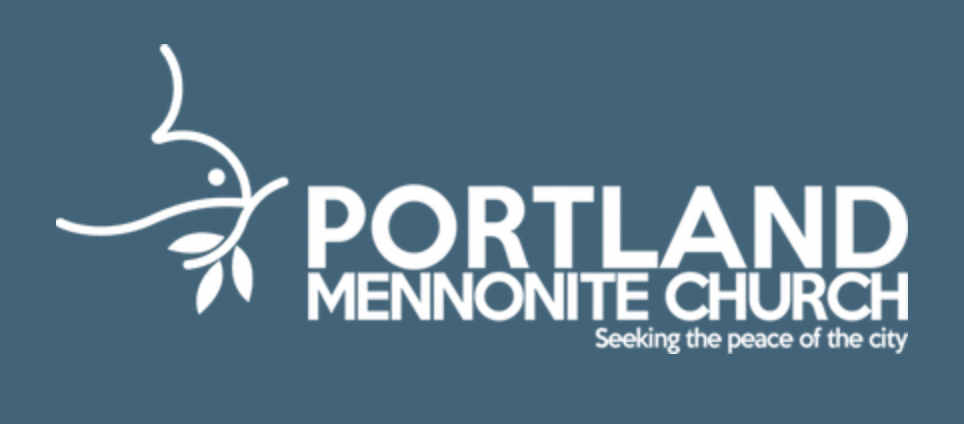
WWGR at Portland Mennonite
Author, white lady, and Mennonite Amanda K Gross will be preaching at Portland Mennonite Church on Sunday morning March 2nd. Join the congregation for worship at 9:30am, followed by a focused white women affinity small group dialogue at 12noon.


Portland Author Event at Jet Black
White Women, Get Ready is coming to Portland, Oregon!
Join author and anti-racist organizer Amanda K Gross for an author talk and Q&A on Thursday, February 27th at 6PM (pacific time).
This event is free and open to the public.

WWGR in Bend, Oregon
Join us for an author talk and book event focused on White Women, Get Ready: How Healing Post-Traumatic Mistress Syndrome Leads to Anti-Racist Change. Author Amanda K Gross will be offering a brief reading, an embodied tool for anti-racist practice, and time for questions and discussion.

WWGR in Seattle
Join author and anti-racist organizer, Amanda K Gross for a discussion of her book White Women, Get Ready: How Healing Post-Traumatic Mistress Syndrome Leads to Anti-Racist Change.
WHEN: Monday, February 24th at 7pm
WHERE: Seattle Mennonite Church, 3120 NE 125th Street*
*This event is co-hosted by Evergreen and Seattle Mennonite Churches.

Stay Gold Books Author Event
Join author Amanda K Gross as she reads at Stay Gold Books in Pittsburgh, PA on February 20th at 7pm.
This event is free and open to the public.

Columbus, Ohio Book Talk
Columbus Mennonite Church is hosting author, Amanda K Gross for a book talk at 12noon on Sunday, February 16th. Join us for a reading and conversation about White Women, Get Ready: How Healing Post-Traumatic Mistress Syndrome Leads to Anti-Racist Change.
This event is free and open to the public.

H'burg Info Sesh
RSVP to whitewomengetready@gmail.com to attend the Jan 12th Info Session
You are invited to join a White Women, Get Ready winter book discussion group with local author Amanda K Gross (EMU '07, MA, PhD) intended to grapple with anti-racism efforts specifically geared toward identifying the silent role white women play in maintaining systemic racism.
About White Women, Get Ready
Inspired by Dr. Joy DeGruy's work on Post Traumatic Slave Syndrome—and used with her blessing—White Women, Get Ready tells the story of how white ladies have been groomed to uphold overlapping systems of oppression, the harmful multigenerational impact, and how we can use our unique positioning to help upend and heal from these violent structures.
About the Author
Amanda was born in the heart of Atlanta, Georgia, to two white Mennonites. Raised in the social justice legacies of Dr. King and her Anabaptist ancestors, she was also raised to be a good little white girl in a system built for her advantage. Over the past two decades, she has committed to the life, study, and embodied work of social justice, including studies in Restorative Justice, Conflict Transformation, and Sociology at Eastern Mennonite University, apprenticing with YogaRoots On Location’s Anti-Racist Raja Yoga School and the People’s Institute for Survival & Beyond’s Undoing Racism Workshop, and organizing with Youth Undoing Institutional Racism, the American Friends Service Committee, and the Black Girls Equity Alliance. Amanda has a PhD from the European Graduate School examining the role of arts and culture in sustaining white settlers in long term decolonization and anti-racist efforts. Follow her on instagram and facebook.
This book is one part of a larger body of collaborative work that emerged from the call within Black-led multiracial and multicultural spaces for white people, and white women in particular, to organize our own. Conceived out of multi-racial organizing community,White Women, Get Readyhas been nurtured, edited, and critiqued within relationships, and is now being birthed, read, and discussed as one interconnected part of ongoing movement work.

Arts Engagement Workshop
The Harrisonburg/Rockingham community is invited to participate in two arts-based workshops led by Amanda Gross and sheba gittens on Saturday, January 11th at the Lisanby Museum on JMU’s campus. Activities will engage with the museum’s current exhibit, Worlds Within and Without: An Exhibition of Contemporary Black Art. The Lisanby Museum and the Furious Flower Poetry Center present artwork from the Art Bridges Foundation in an exhibition celebrating the work of contemporary Black artists. There is no cost to attend, and participants may attend the first, second, or both workshops. Registration is limited; please click here to sign up by January 8, 2025.
10:00-11:30 am
Worlds within and without: An integrative arts-based engagement with self and community
1:00-2:00pm
Worlds Restore within: A restorative guided meditative drawing experience. Come rest, restore, and review within an embodied neurographic art practice (bring a yoga mat if you have one).
Facilitators:
sheba gittens is an anti-racist heArtivist, art educator, and creative consultant based in this iteration of the world. She is a trained Wellness Practitioner, Anti-Racist Raja Yoga Instructor, and Joy Facilitator. As a creative consultant she has supported numerous organizations and businesses nationally and internationally in manifesting events, programs, and workshops grounded in equity for humanity and that honor intersectionality. As an integrative multimedia heArtivist, she uses mixed media to educate and expand the consciousness of those she serves and currently works with the Ujamaa Collective, Balafon West African Dance Ensemble, and YogaRoots On Location.
Amanda K Gross is an intersectional anti-racist organizer and a weaver of people, ideas, and threads. As the founder, author, and creative director of Mistress Syndrome, she writes about the interconnectedness of racism, patriarchy, capitalism, and white womanhood. She is an anti-racist coach, educator, facilitator. As a hand weaver, mixed media artist, and trained yoga instructor, she integrates creative embodied practices throughout her organizing. Amanda is certified at the 200 hour RYT level by YogaRoots On Location’s Anti-Racist Raja Yoga School. She has an MA in Conflict Transformation from Eastern Mennonite University’s Center for Justice and Peacebuilding and is currently pursuing a PhD in Expressive Arts at the European Graduate School in Saas-Fee, Switzerland. Amanda is the author of the recently published book, White Women, Get Ready: How Healing Post-Traumatic Mistress Syndrome Leads to Anti-Racist Change.
Location:
Lisanby Museum, lower level of JMU Festival Conference and Student Center
1301 Carrier Drive
James Madison University
Harrisonburg, VA 22807
Free parking will be available in lots C12, D3, R4, across the street from the Festival.

Milwaukee Book Event
Boswell Book Company
2559 North Downer Avenue Milwaukee, WI 53211
Boswell Book Company presents an evening with Amanda K Gross, to discuss her latest book, White Women, Get Ready: How Healing Post-Traumatic Mistress Syndrome Leads to Anti-Racist Change.
White ladies are everywhere. But as we navigate powerful social spaces and the everyday moments that shape our lives, we must confront our complicity in upholding racist systems. Part historical analysis, part memoir, and part call to action, White Women, Get Ready tells the story of how we white ladies have been groomed to uphold overlapping systems of oppression and how we can use our unique positioning to help upend these violent structures.
Amanda K Gross is an intersectional anti-racist organizer and a weaver of people, ideas, and threads. As the founder, author, and creative director of Mistress Syndrome, she writes about the interconnectedness of racism, patriarchy, capitalism, and white womanhood. She is an anti-racist coach, educator, and facilitator.
Registration is requested. Click here to register.

Assembly Mennonite Church in Goshen, Indiana
Join us for an evening talk by author, Amanda K Gross on Anti-Racism, White Womanhood, Harm & Repair at Assembly Mennonite Church, 727 New York Street in Goshen, Indiana.


WHITE WOMEN, GET READY: SUSTAINING ANTI-RACISM IN THE YEAR OF 2024
…at the Severna Park Public Library
PROGRAM DESCRIPTION
Author Amanda K Gross will read from her book, White Women, Get Ready: How Healing Post-Traumatic Mistress Syndrome Leads to Anti-Racist Change, introduce an embodied tool for action, and invite participants to engage with the book's framework, personal reflections, and each other to consider their own intersections, experiences, and perspectives on the themes.
This interactive reading, facilitated discussion, and activity will share lessons learned from multi-racial, multicultural, and white affinity organizing with a focus on how white women and femmes can courageously get ready for—and sustain—deep and long-lasting commitments to anti-racist change.
Program Type:
Books and Writing, Diversity, Equity, Inclusion, Women’s Interest

Lancaster Author Event
Join author, white lady, and Mennonite for a reading and Q&A to learn how White Women, Get Ready seeks to dismantle and transform the legacy of white womanhood:
The Gallery at East Chestnut Street Mennonite Church
436 E Chestnut St, Lancaster, PA


